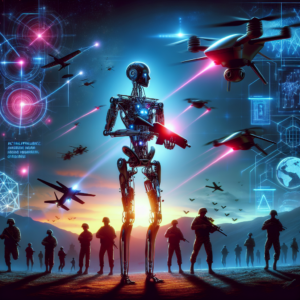
Israel, known for its technological innovation and military prowess, has been at the forefront of integrating artificial intelligence (AI) into its defense strategies. This article explores how AI technologies are utilized in various aspects of Israeli warfare, from intelligence gathering and analysis to autonomous weapon systems and cybersecurity. By examining case studies and statistical data, we aim to comprehensively understand AI’s impact on Israel’s military capabilities and its implications for future conflicts.
AI has revolutionized the way Israel collects intelligence. AI-driven technologies allow for the processing of vast amounts of data at unprecedented speeds. For instance, satellite imagery and signals intelligence (SIGINT) are analyzed using AI algorithms to identify potential threats and gather actionable intelligence.
Israel employs advanced surveillance systems equipped with AI to monitor hostile activities. One notable example is automated drones that utilize AI for real-time data analysis, enhancing situational awareness and operational efficiency.
- Automated threat detection
- Real-time decision-making support
- Enhanced image and pattern recognition
Israel is a pioneer in developing and deploying UCAVs, such as the Harpy, which are designed to locate and engage radar-emitting targets autonomously. These AI-powered drones reduce the risk to human pilots and increase precision in targeting.
### Robotic Ground Systems
The deployment of robotic ground systems, such as the Guardium UGV, illustrates how AI performs routine patrols and surveillance missions. These robots have sensors and AI algorithms to navigate challenging terrains and make autonomous decisions.
- Reduction in human casualties
- 24/7 operational capability
- Improved accuracy and response times
Israel’s cybersecurity infrastructure heavily relies on AI to detect and respond to threats. AI systems analyze patterns and anomalies that could indicate cyber attacks, enabling proactive measures and rapid response to potential breaches.
In addition to defensive strategies, Israel reportedly uses AI to enhance its offensive cyber capabilities. AI algorithms can disrupt enemy communications and infrastructure, showcasing a new dimension of warfare in which battles are fought in the digital realm.
- Real-time threat detection and mitigation
- Automated system recovery and defense adjustments
- Offensive cyber operations against hostile targets
The integration of AI in warfare raises significant ethical questions, particularly regarding autonomous weapon systems. The decision-making process in targeting and engagement by machines involves complex moral and legal challenges that are still being debated internationally.
AI’s role in warfare also has profound strategic implications. It enhances a nation’s military capabilities and escalates the arms race in AI technology. Countries worldwide are now investing heavily in AI military technologies, potentially leading to a new era of warfare.
- Global AI arms race
- Shifts in military power dynamics
- Development of international norms and regulations
In 2007, Israel conducted Operation Orchard to disable a suspected nuclear reactor in Syria. AI and cyber warfare played crucial roles in this operation, where Israeli forces reportedly used AI algorithms to jam Syrian radar systems, effectively making their jets invisible.
The Iron Dome missile defense system is another example of AI’s application in Israeli defense. It uses radar and AI to track incoming projectiles and determine whether they threaten populated areas, providing real-time defense against short-range rockets.
AI’s integration into Israel’s military strategy has significantly enhanced its defense capabilities, making it one of the most technologically advanced armies in the world. From intelligence gathering and autonomous weapon systems to cybersecurity, AI plays a pivotal role in modern warfare. However, AI’s ethical and strategic implications in military applications remain a topic of intense debate and scrutiny. As AI technology continues to evolve, it is imperative for global leaders to establish norms and regulations that govern its use in warfare, ensuring a balance between technological advancement and ethical responsibility.
No tags for this post.


